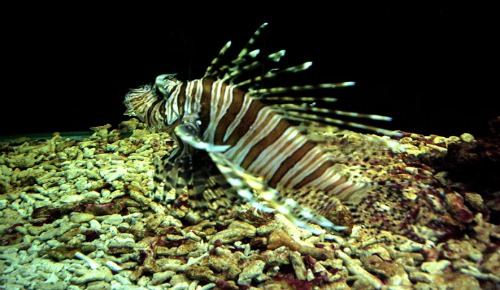Florida has a species of fish lurking in the water that could cause major damage to the marine life.
Officials say the Lion Fish was caught in Brevard County over Labor Day Weekend at Port Canaveral’s Jetty Park.
Florida Fish and Wildlife Commission say the fish are venomous and they need to be kept under control or they will kill off other native fish and marine life. FWC encourages fisherman to kill the fish and discard them.

Lion Fish can in fact be harmful to reefs and endanger other marine life because they are considered to be at the top of the food chain.
There are however some facts the public should be aware of when it comes to the Lion Fish. Researchers for National Geographic say the public has been misinformed on several key aspects in regards to the Lion Fish.
Poisonous Versus Venomous
* There is a difference between poisonous and venomous. Lion Fish are not poisonous but in fact venomous. Lion fish have venomous spines in their dorsal fins, pelvic, and anal areas that can inject venom through a puncture wound they inflict on their prey. Lion Fish are not poisonous for the fact that poison from a poisonous fish is delivered by ingesting it or secretion through the skin of its prey. Researchers For National Geographic say there is a clear difference between the two.
Lion Fish Are Edible
* Lion fish are in fact edible despite what the public has been lead to believe. The meat of a Lion Fish is white and extremely delicious. Unlike poisonous fish that cannot be ingested, Lion Fish are just the opposite. The spines must be cut off prior to eating thus completely removing the venom. It is the same theory behind eating rattle snake meat. Many restaurants through the U.S. have started listing Lion Fish on their menus to promote public awareness and at the same time satisfying its customers. Lion Fish have been deemed so tasty that they boast a price tag of $16 per pound, much higher than that of Red Snapper. According to the National Oceanic and Atmospheric Administration and the National Center for Coastal Ocean Science there has not been any reported cases in the U.S. from anyone being sick after eating a Lion Fish that has been filleted and served up. If you have ever dined in a Caribbean restaurant and ordered seafood, chances are you may have eaten it and not even known.
Limit On Lion Fish
* The FWC does not have any set legal size or bag limits for Lion Fish, says FWC Officer Lenny Salberg.
How Can Lion Fish Be Caught
* Lion Fish grow to be 15-16 inches long and usually hang out around reefs and is shallow water but can be found up to 1,000 feet deep. Because Lion Fish are considered to be invasive to Florida reefs and other marine life, Lion Fish can be caught by any means, says FWC Officer Lenny Salberg.
* Hook
* Spear
* Net
* Trap
* Hands [Wearing proper protective gear]
In 2012 the National Oceanic and Atmospheric Administration launched a campaign in order to try and get the population of Lion Fish under control and at the same time educate the public.
The slogan for that campaign is “You have to Eat’Em to Beat’Em.”
For more information visit the non-profit organization for Lion Fish.
